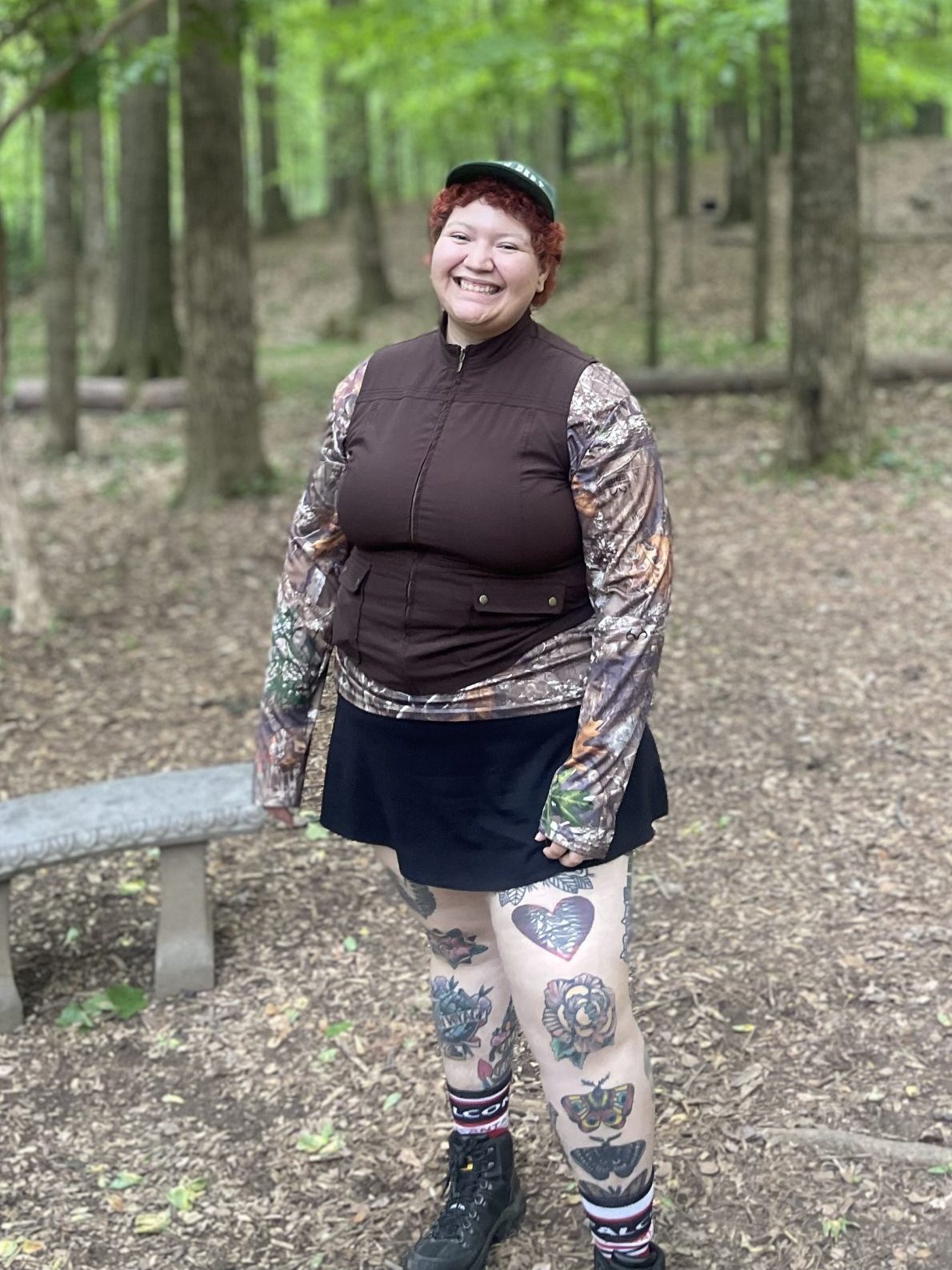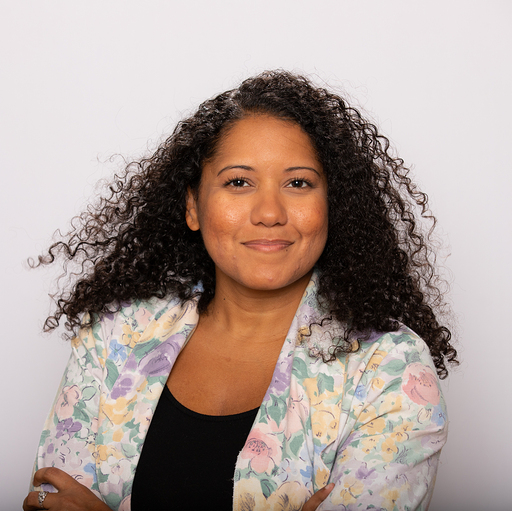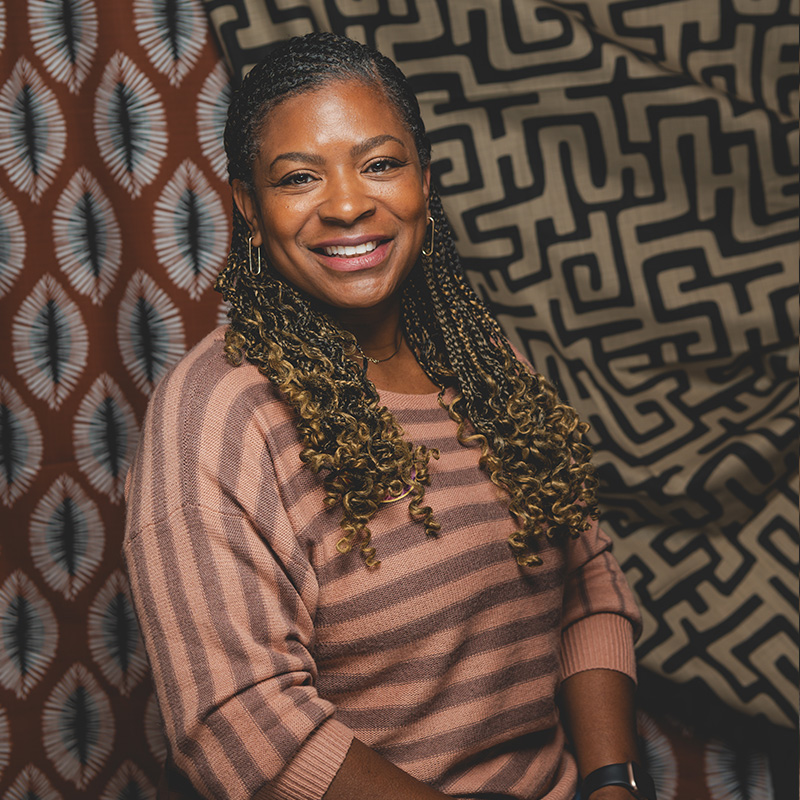
Maria Soto
Maria Soto
Speaker 1 (00:00):
Greetings. This is Javier Palacios. And I’m Daisy Mugford. And it is April 24th, 2024. We are at the Outdoor Activity Center in Atlanta, Georgia, recording this oral history as a part of the Storming Caesars Palace Our Stories Our Justice screening in collaboration with the West Atlanta Watershed Alliance. Can you give us your name?
Speaker 2 (00:21):
Yes, my name is Maria.
Speaker 1 (00:22):
And how old are you?
Speaker 2 (00:24):
I am 29 years old.
Speaker 1 (00:26):
Where were you born?
Speaker 2 (00:28):
So I’m raised in North Atlanta and I’m made in the S swats.
Speaker 1 (00:31):
Okay,
Speaker 2 (00:32):
Okay. Atlanta native.
Speaker 1 (00:33):
Perfect. Is there an ancestor or a woman who inspires you today?
Speaker 2 (00:41):
Yes, many both in the ancestral realm and also just women in general. For me, I’m a little bit disconnected from my ancestors physically. I didn’t really meet my grandparents or anything. I’m a first gen, so I’m very separate from them. But the people who I have been able to encounter, whether through ancestral veneration or if I did just happen to meet them one time I met my grandmother for one month back in 2019, and that was the only time I ever saw her, and she passed away shortly after. But one person, ancestrally, who does benefit me a lot, and who inspires me a lot, is my grandmother on my father’s side, who I actually have never met, but her name is Esperanza and she passed away before any of us were born. But she’s somebody who spiritually has been very close to me and has aided me and helped me and protected me many, many times.
Speaker 2 (01:38):
And as far as women in general who inspire me, there’s so many, honestly, both locally and people that I know, people that I don’t know. So locally, the women who inspire me is people like Rosa Duffy from For Keeps Books, all of the ladies at Wawa, literally. So Daisy, Janelle, well, I don’t know if you guys identify as femmes, but yeah, Anna Marie Ivory, all of you guys are a huge inspiration. Also other people who also are kind of in the same environmental field. So Simone Adams from Color, my outdoors, Corta Raven from the streets is calling. So all the people who are out here doing the work, who are doing the work and building community and international women who inspire me, my first ever person that I looked up to was Malala Yusefi, who they are a liberation worker in the area of educational equity for young girls who are in areas that are controlled by the Taliban. And she gave her life to that. She literally got shot in the face by the Taliban fighting for young girls to have the right to education. So she was the first person to really make me feel like young people can do it too. That’s right.
Speaker 1 (02:53):
Makes you rest peacefully.
Speaker 2 (02:54):
She’s still with us.
Speaker 1 (02:55):
Okay.
Speaker 2 (02:56):
She survived, but she was still a child who got shot in the face by grown men.
Speaker 1 (03:02):
That is crazy. Okay. How does this inspiration show up in your life or your work?
Speaker 2 (03:09):
Let’s see. The way that it helps me the most, the way that it shows up for me the most is that I rely upon my community. And a lot of the work that I do relies upon building community links and finding people to fight for the cause essentially. And really just building a network of liberation workers and people who are actively not only have stakes in liberation of the community, but who are actually doing the work. So the way that this inspiration, the way that these women have inspired me is to one, of course never give up. And two, just stay ready. It’s not all peaches and cream when you’re in this line of work, when you’re actively trying to go against the status quo, people die. People can kill you. They can either try to cancel you so academically cancel you or whatever, socially cancel you because they don’t like what you’re saying, or they can literally try to take your life from you. And I think just like how these women have persevered, that’s a huge inspiration to me because despite all of these things, despite the risks, despite the danger to their lives, they still continue to move forward and they’re operating under a goal that’s bigger than them. And those are the people who just inspire me. Like, if I can do it, if they can do it, I can do it. Is essentially how I move.
Speaker 1 (04:35):
I love that. Thank you for that. That does lead us into the story of Ruby Duncan again, is that she was a welfare activist, Las Vegas native, and she pretty much fought for the whole country to get adequate welfare and government monetary assistance. And again, she was faced with police brutality within America as a black woman with children. So yeah, just raising that part of her activism. Do you believe that there are similar challenges faced by your community today? Just as far as social service assistance or government assistance that claim that it’s for this, but really it’s doing more harm than good to people?
Speaker 2 (05:20):
This is a long answer for me. So I think really understanding the historic context behind what even is welfare. So last year I read this one book, it was called Clean, Pure, and White, something like that, cleaning and Pure and Good, something like that. But it’s essentially equating how cleanliness is close to godliness, which is really just close to whiteness. And in that book, I learned that the first time that the federal government ever gave any kind of public aid was as a result of an earthquake that happened, I think, in North Carolina. And so it was a huge earthquake. It disrupted a lot of systems and people. The crops weren’t able to be planted in time, et cetera, et cetera. So the government stepped in and they gave money. What ended up happening is that people from all over the country who were disempowered, who didn’t have resources all came to North Carolina to receive these funds.
Speaker 2 (06:13):
Well, at the time that this happened, it was right after laws had changed and enslavement had ended. So a majority of the people who were in need and disenfranchised by design, where people of color were black people or people who are actively targeted. So once the government realized that people were getting aid, it was like they turned it from a place of helping people to a place of controlling people because now that they couldn’t physically put you in bondage, which they still do to this day is still alive and well, once they realized that they couldn’t control you through physical bondage, they started to control you through starvation and essentially taking away your ability to eat. And that’s how they today, in my opinion, still continue to control these populations, is by literally destabilizing them and making people have no home and making people have no access to food, the fastest way to kill somebody.
Speaker 2 (07:07):
No water, no food. So once they realized that they couldn’t, you now were protected federally and that they couldn’t just do whatever they wanted to you and steal you and put you in bondage, they started to use food as a form to bind people. And so when Ruby Duncan, modern day person who is still fighting for access to welfare, for people to understand really what it is that she’s against the system that she’s fighting, welfare is literally designed to monitor people, to monitor people, and also keep them controlled. I only know some stuff about welfare. I’ve not been on it, so I don’t know. But I know right now that it is the lowest amount of people have ever been on welfare. There’s only a million in the country. It’s extremely difficult to become qualified for it. The application process is really hard on purpose, and they’re just trying to exclude people from having access to food, which if they provided living wages or some kind of rental caps, anything like that, that would make it possible for people to live here, people wouldn’t rely on welfare, but it’s like it’s very Stockholm syndrome. They’re the people causing you to starve, but they’re also the people giving you this little bit of aid to not starve, and they kind of dangle it in front of you and make you jump through a bunch of hoops, income requirements. So if you have lost your job, you don’t qualify for welfare, like food stamps, you don’t qualify for that anymore, right?
Speaker 2 (08:43):
If you don’t have a job, which I would say are the people who need the food the most. So there’s a lot of barriers in it. And just the way that that system is even structured, it’s like, I don’t even know, it’s is demented, like I’m going to spit in your face and then hand you the tissue to clean it up. So yeah, the first people like Ruby Duncan who are actively trying to expand that service, they’re literally looking the beast in the mouth and being like, this is scary. This is literally designed to bind me, to put my people in bondage to hurt me, to surveil me. And still I understand that my people need this service. And not only my people like my community, but literally my children. My kids got to eat and this is supposed to be the service to come in and help me with this. And it’s not even just some random service. These are things that we pay for sales, taxes, property taxes, we all fund this. It’s not money that comes from nowhere, you already paid it. You know what I’m saying? So it’s literally just give me access to my own resources. Yes, yes, yes, yes. So I guess in what ways does Ruby Duncan’s story and activism resonate with the challenges faced by my community today?
Speaker 2 (09:55):
Same shit. Different day, same shit, different day. Again, it’s all part of that same cycle. It’s all part of that same system. And what’s the goal of that system? Annihilation. So as long as you’re a participant in it or you live in the belly of the beast, if you live at the core of the empire, we do, anything that you do is either upholding that or at odds with it. And if you’re at odds with the system, they’re coming for you. Absolutely.
Speaker 1 (10:22):
So within just your work and knowing what have you personally faced any barriers in accessing resources or information about available assistance or housing programming?
Speaker 2 (10:35):
Oh, yes. So especially during 2020, right. So I’m at an interesting intersection because on paper, I look like Buena, what I’m saying. So I have the degrees. I’ve worked in these capacities. I’ve been in these spaces, like academic spaces, federal spaces. So on paper it looks that I’m nice and colonized. And so early 2020, I was one of the people who also lost my job because of Covid. And those first six months, amazing, bro, we was getting money left and they was getting us unemployment. They were giving us everything, free food. My apartment complex was even like, oh, if you can’t pay rent, okay, yeah. And it was really nice experiencing that. And I was like, oh, wow, the government is actually helping us. I never believed that that day would come that the government actually took care of its people. But yeah, those first, I would say four to six months, it was great.
Speaker 2 (11:29):
Really, the government stepped in and they helped me by giving me my own money that I already paid. And I think right when they started cracking down on unemployment benefits and things like that, I thought that I was safe because I’m an academic, I’m published researcher, dah, dah, dah. I’ll be safe. Nope, nope. And yeah, I think it was around, it was really four to six months in and just all the resources for me stopped what used to be something that I could fill out on my phone. Now I had to go in person. Now I had to wait on the phone for three hours trying to talk to somebody about how can I get food? How can I get money to eat? It was like that because at the time I was working in the school system and all the schools had closed so that I didn’t have a job.
Speaker 2 (12:17):
And so I think really just seeing that, oh, at the beginning they were really with me, but then they just pulled the rug out from under me. And then, yeah, I just realized my Caucasian counterparts weren’t experiencing that. They, for the next two, three years, still continue to get funding to get unemployment benefits despite them working too, still continue to get welfare benefits, housing benefits, unemployment benefits. But then here I am thinking that I did everything. And then, I mean, to me, it felt like they were trying to kill me. They took away my ability to become stable. But yeah, that’s my personal experience with facing barriers. It was super easy. But then once they decided that I was doing too well for somebody of my skin tone, they decided to cut everything off, cut all my resources off. And yeah, I mean, I still have residual trauma from that time to a point where it’s like not only are you struggling to even get food, but it’s like think about all the people in my community.
Speaker 2 (13:18):
A lot of people don’t have access to government benefits ever. So it’s like all of those people still, somehow with their four kids, had to find a way to feed them. And so it came to a point where me and my friends who were all getting unemployment benefits, the little bit of money you would get two 40 a week. So the little bit of money that we would have left over, we would pull it together and then we would do, what’s it called? The grocery ordering. Do you know what I’m talking about? Yeah. We would do the online grocery ordering for single mothers, and we would send food to their houses. And I mean, we sent food as far as Alabama, and we would just call up the local system over there, whatever app that they had. I can’t remember. It’s like goPuff or something like that. Yeah, goPuff one of those. And yeah, we would literally just pool our little money together, like $15 each and just get groceries for these kids. Their mom doesn’t have papers, can’t get any resources, she’s too sick to work, and there’s four kids and one’s a baby. So it’s like, even though we didn’t, even though we barely had anything, literally not even enough to eat ourselves, we still found ways to give back to our community and just to build that network of solidarity.
Speaker 1 (14:26):
I love that. You’re such a rebel. Just all in your own.



